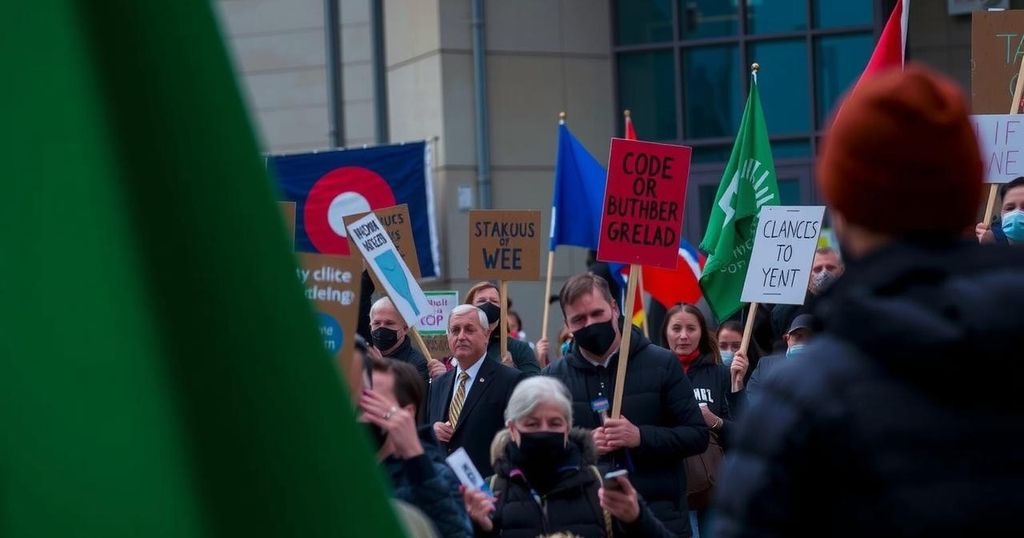At COP29, vulnerable nations protested against insufficient climate finance offers from developed countries, culminating in a walkout by representatives of small island states and African nations. An advocated increase in commitment to $300 billion annually by 2035 remains inadequate according to climate ministers from affected countries, highlighting the divide between developed and developing nations. Activists and critics urge solidarity to ensure adequate support addressing their urgent needs to combat escalating climate threats.
At the COP29 conference in Baku, Azerbaijan, representatives from some of the world’s most vulnerable nations staged a walkout in protest against stalled negotiations regarding a pivotal climate finance agreement. The walkout followed frustrations regarding the financial commitments of wealthy nations, as delegates from small island nations and impoverished African countries expressed their dissatisfaction with the current proposed deal, which they deemed inadequate. The chairman of the Alliance of Small Island States, Cedric Schuster, conveyed their discontent, stating, “We’ve just walked out. We came here to this COP for a fair deal. We feel that we haven’t been heard.” A draft proposal recommended that developed countries increase their financial support to developing nations to $300 billion annually by 2035, up from earlier offers of $250 billion, which had been met with sharp criticism.
Despite the efforts by developed nations, many delegates from poorer countries maintained that the pledges did not sufficiently address their needs. Jiwoh Abdulai, climate minister of Sierra Leone, condemned the draft as akin to a “suicide pact” for vulnerable nations. The ongoing negotiations revealed a stark divide between the interests of wealthy nations and those most affected by climate change. As discussions progressed, a sense of urgency within the hall was palpable, but the path to a unified agreement remained fraught with disagreement.
The European Union and the United States have pushed for substantial commitments, yet their calls for conditional agreements, especially concerning fossil fuel transitions, encountered resistance from oil-dependent nations. The backdrop of recent political changes, including the election of climate change skeptic Donald Trump in the U.S., has cast uncertainty over future financial commitments. Activists and critics emphasized the need for solidarity among developing countries, urging them to remain resolute against going back on commitments that would undermine their long-term survival in the face of climate threats.
However, the proposed $1.3 trillion overall target to combat climate change, primarily funded by private sources, has raised concerns over its feasibility against the backdrop of historic country obligations. Despite the progressive increase from the previous $100 billion commitment, the demanded figures of $500 billion by developing nations remain relevant amidst inflationary complexities. As the conference nears its conclusion, the outcome remains uncertain, with calls for a resolution that adequately addresses the dire needs of the most vulnerable countries in the climate crisis.
The UN COP29 conference serves as a critical forum where countries convene to address the pressing challenges of climate change, particularly in negotiations surrounding financial support for developing nations. Historically, wealthier countries have made commitments to assist poorer nations in combating the adverse effects of climate change. Yet, recent talks have highlighted significant gaps between promises and actual commitments, prompting voices of dissent from nations such as small island states and various African countries facing existential threats due to rising sea levels and climate-induced disasters. The conference reflects broader geopolitical tensions, including the economic implications of transitioning away from fossil fuels, making it an important juncture for global climate policy.
In conclusion, the ongoing discussions at COP29 underscore a deepening divide between the climate finance commitments of wealthy nations and the expectations of vulnerable countries. The protests led by delegates from small island nations and impoverished states are emblematic of a broader call for equitable solutions to the climate crisis. The insistence on a significant increase in financial support to $300 billion is a step towards addressing the needs of affected nations, although many assert that this falls short of what is necessary. As the world grapples with enhanced climate challenges, the outcome of this conference will have lasting implications for international cooperation and climate action.
Original Source: www.fox28spokane.com






